It is possible that you have read a number of articles published over the last few days in the most important media outlets in the USA, the UK, Italy, Spain and France, regarding a study carried out in Hospital de la Fe, in Valencia (Spain).
This “scientific investigation“ states that “a baby fed with only almond milk contracted scurvy”, with the following conclusion:
“Plant milks do not constitute a complete diet and cannot substitute breast milk or formula milk*”.
As a result of this study, there has been an orgy of crazy headlines like “Feeding babies almond milk causes scurvy” and “Vegans almost kill baby in Valencia”.
Write “scurvy almond milk” in Google and see for yourselves.
We have been warning about global attacks on plant milks for two years now (Drink cow milk, plant milks does not exist), but this “scientific” article published in the prestigious Pediatrics magazine, and the sensationalist media bomb with which it has been presented to public opinion, deserve a separate article.
We will just present some facts and you can judge freely after reading them:
1- The scientific investigation. It hasn’t been easy to get our hands on it because it is not available without paying a fee. Here you have the Pdf with the full research details:Estudio completo Escorbuto por leche de almendras. We have based our own analysis of the case on this research.
2- Breastfeeding: The fact that breastfeeding and its benefits for the baby are irreplaceable is an undisputed fact, and for this reason, breastfeeding in public without being taken to task or even fined, is every mother’s inherent right.
 « м Ħ ж » via Compfight
« м Ħ ж » via Compfight
Nonetheless, to be more accurate “the study” should not conclude with the confusing phrase that “plant milks do not substitute breastfeeding or synthetic formula milk*” because this is a play on words which dangerously equates breastfeeding to synthetic formula milk*.
During the first 6 months, neither plant milks nor synthetic formula milk can, or should, substitute breast milk, which is the only milk which provides all the nutrients that newborns need.
3.-Formula milk*. It is very strange, to say the least, that at no time does “the study” (nor the countless news articles) mention that “synthetic formula milk”* is the main cause of allergies relating to cows’ milk protein, which is one of the most common and severe allergies in babies the world over.
*Synthetic milk processed from cows’ milk protein which is mainly given to babies when they stop breastfeeding, or sometimes simultaneously.
In fact, the baby who contracted scurvy had suffered from “dermatitis” during the first two and a half months of his life while his mother was giving him “formula milk processed from cows’ milk in the absence of breast milk”. For this reason the family doctor (now vilified) advised the mother to give the baby almond milk.
“The study” tiptoes around this subject without giving it the slightest importance, even though dermatitis is, in fact, one of the skin-based symptoms of milk protein allergies, together with hives, eczemas, edemas, etc…
4- Milk protein allergy (not to be confused with lactose allergy): Surprisingly, the ethically questionable Nestlé imagine, the charitable UK foundation “The Children’s Allergy Foundation” and even the magazine, Pediatrics of the “American Academy of Pediatrics”, state that this allergy is also linked to severe digestive disorders (chronic diarrhea, vomiting, stomach pains, etc.) and respiratory disorders (asthma, whooping cough, etc.)
Between 2% and 3% of babies around the world suffer from this allergy, although when they get older, only approximately 20% continue to be chronic. In other words, millions of people on the planet have suffered from this allergy since they were babies.
5- Difference between industrial and homemade plant milk. According to “the investigation”, during several months the baby’s parents only gave their baby industrial Ecomil almond milk (together with refined products like instant almond powder of the same brand, among others).
It really doesn’t matter if the brand is Ecomil, Alpro, or Gerblé…

In plantmilk.org we have always emphasised the huge differences between packaged plant milk and homemade plant milk. You can see the video we recorded on this subject in this article (Differences between “homemade” and “pre-packaged” plant milks) or read the conclusions of this other article on the exciting and unknown history of plant milks based on our own investigation.
However, numerous journalists state that “taking only plant milks or drinks can cause scurvy in a baby”, without stopping to differentiate or explain to their readers the huge difference between natural and packaged plant milk
Even the study’s own researchers talk of “plant milks” generically in their conclusions.
Just to be crystal clear about this:
Packaged plant milks undergo ultra-pasteurisation and sterilisation, processes which result in the elimination of the great majority of microorganisms which make natural plant milks highly nutritious, with a wide range of vitamins, nutrients, unsaturated fats, amino acids, enzymes, etc. Natural plant milks only last for between 3 and 5 days kept in a fridge at under 5º.
So, what they sell to us as “plant milk” in the supermarkets and shops in countries all around the world with a shelf life of 2 years at room temperature is no more than almond-flavoured water.
In any case, the family in question made a mistake by only feeding their baby with formula milk in the first two and a half months and the following months with industrial milk, because, we insist:
Breastfeeding is the only way of covering all the baby’s needs, and during at least the first six months, if a baby cannot be breastfed, we recommend that you go to an official breastmilk bank and do not give them formula milk or plant milks.
6- Scurvy: Scurvy is a serious dietary deficiency if it is not treated on time. It consists of an absence of vitamin C, which leads to serious health problems. In the past, sailors used to suffer frequently from scurvy due to the prolonged absence of fruit and vegetables in their diet during long sea crossings.
And now, let’s apply a little common sense:
If, instead of industrial plant milk, the baby had been given orange juice from a carton, cow’s milk, or mineral water, exactly the same thing could have happened.
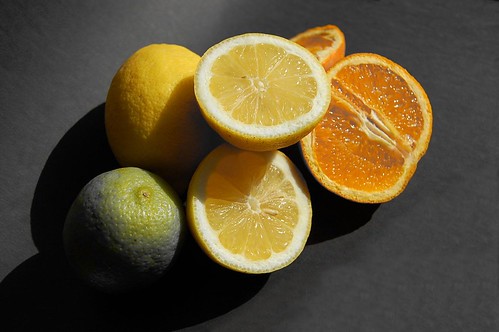 Creative Commons License Robynlou Kavanagh via Compfight
Creative Commons License Robynlou Kavanagh via Compfight
7- Improvement in the baby’s health “when the almond milk is eliminated from his diet”.
“The investigation” then explains that when the baby was 6 months old its mother tried to give him fruit and vegetable purees with no success (it is insinuated that this was due to the negative influence of the almond milk, although this is not specifically stated).
It is then that the mother sees that the baby is very poorly and takes him to the Hospital de la Fe de Valencia.
Following the relevant tests the baby was diagnosed with scurvy and the researchers took charge of the baby. They injected him with doses of vitamin C and started to give him purees made of fruit, vegetables, cereals and meat… and, attention, mainly formula milk.
The case is that, logically and fortunately, once the baby began to eat fruit and vegetables, together with its dose of vitamin C, his health began to improve.
“The investigation’s” official conclusion:
“Plant milks do not constitute a complete diet and cannot substitute breastmilk or formula milk*”.
Our conclusion:
That an investigation based on only one case at global level has had the media effect that it has had only concentrating on how “nutritionally incomplete plant milks are” and how “irreplaceable synthetic formula milk is”, is, at the very least, biased and incomplete.
Moreover, in our opinion, the fact that no journalist reflects on the fact that “synthetic formula milk” is one of the main causes of allergies in millions of babies, and more importantly, that breastmilk should never be replaced with either formula milk or plant milks during the first 6 months of a baby’s life, shows a disturbing lack of professionalism.
And finally, for all our clients and friends, we’d like to leave you with an important historic “tip”:
 Creative Commons License PWRDF via Compfight
Creative Commons License PWRDF via Compfight
During thousands of years midwives, or “parteras”, as they used to be known in Spain (women with great experience who helped other women to have homebirths), always said “breast first”, the irreplaceable breastmilk.
In cases when the mother could not produce her own breastmilk, they recommended them to ask women known as wet nurses to breastfeed their babies in their first months of life.
Nowadays, we insist that you can use breastmilk banks.
Curiously, the same midwives that helped our ancestors to give birth, especially in the Mediterranean, recommended to the mothers that both during and after their pregnancy, they should complement their own diet and the baby’s with fresh milk made from almonds, tigernuts or other seeds.
Listen to the wisdom of our ancestors and not to sensationalist and alarmist journalists.
Also remember that after the first 6 months of breastfeeding, when you are making plant milks at home for your babies you can complement them by adding whatever fruit, herbs and vegetables you wish.
Balance is the key to a healthy life and your instinct and common sense is more important than the continuous misrepresentations that TV and some media outlets present to us in this world which is constantly being bombarded with a relentless and stressful stream of information and disinformation.
Don’t let them confuse and deceive us!
Live life with happiness, common sense and, above all, without fear.
Andoni Monforte
ChufaMix Inventor
Founder of Món Orxata

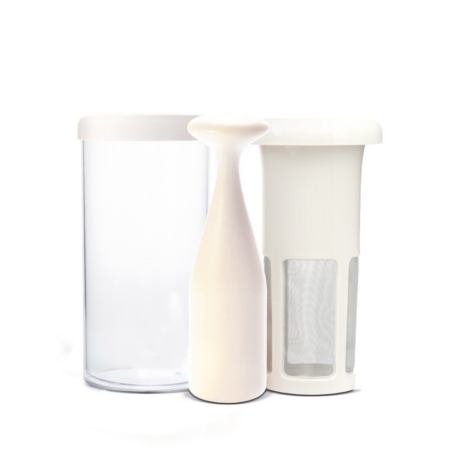
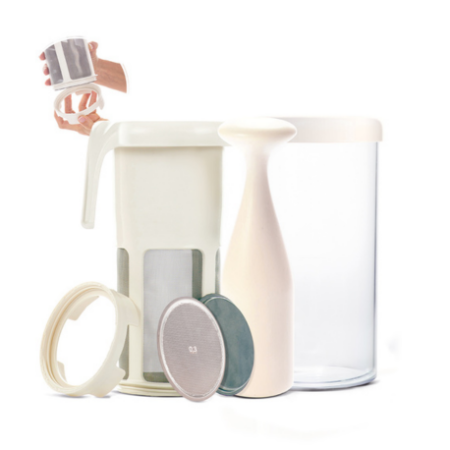
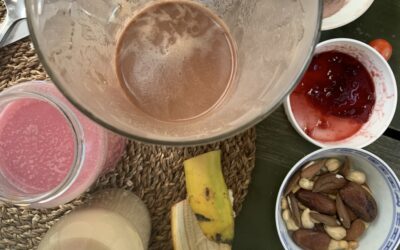
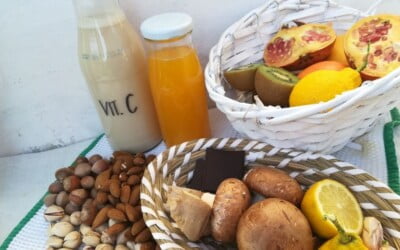

0 Comments